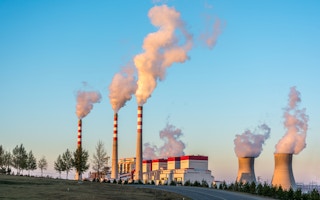China’s efforts to combat pollution are gaining momentum after President Xi Jinping pledged in March at the annual session of the National People’s Congress to punish violators of the nation’s environmental laws with an “iron hand.” Here’s what’s happening and what to expect.
1. Environmental protection laws tightening
Amendments to the Environmental Protection Law that went into effect on Jan. 1 allow for consecutive daily fines on polluters if they don’t improve and provide channels for whistle-blowers to make environment-related appeals. Non-government groups can also sue for environmental damage under certain conditions.
The nation also plans to enact its first laws to curb soil pollution and amend laws to protect the air and water.
2. Curbs on emissions planned and fake data targeted
Beijing is set to close the last of its four major coal-fired power plants next year. The facilities will be replaced by four gas-fired stations with capacity to supply about 2 1/2 times more electricity than the coal plants.
The closing comes as China aims to cut sulfur dioxide emissions by 3 percent, nitrogen oxide by 5 percent and ammonia nitrogen by 2 percent this year, according to an official statement.
“We are going to punish, with an iron hand, any violators who destroy ecology or the environment, with no exceptions,” Xi said at this year’s annual legislative meeting.
The Ministry of Environmental Protection will also launch a two-year inspection targeting faked air quality data and will hold people accountable after some local governments were found to have fabricated data, the Xinhua news service reported April 1, citing Environment Vice Minister Wu Xiaoqing.
3. Environment-related companies should benefit
Steps to clean the environment are pulling up the shares of electric car makers including BYD Co. and solar maker Hareon Solar Technology, as well as water company Anhui Water Resources Development.
Desulfurization unit producers like Zhejiang Feida Environmental Science & Technology Co and Beijing SPC Environmental Protection Tech Co have risen by more than 50 per cent and 40 per cent respectively this year. Hebei Sailhero Environmental Protection High-tech Co, a company that makes monitoring equipment, rose by almost 40 percent. Guangxi Bossco Environmental Protection Technology Co, a waste-water treatment company, has surged more than sixfold since listing in February.
4. More investment to be made in solar panels
Responding to a historic carbon deal reached in November between Xi and his US counterpart, Barack Obama, China has raised its solar target for 2015 to as much as 17.8 gigawatts.
The more ambitious goal may attract as much as 21 billion yuan ($3.4 billion) of additional investment to solar projects compared with the earlier plan, Bloomberg New Energy Finance estimates.
Moreover, the nation of almost 1.4 billion people is targeting a more than tripling of its solar power capacity to 100 gigawatts by 2020, the National Development and Reform Commission said in November.
China led in renewables last year with investments of $89.5 billion, according to BNEF figures released in January.
5. Expect more pressure on local government officials
Local officials whose promotions are often tied to faster economic growth are now boasting of their environmental activism, a contrast to former years when they cared about nothing except economic expansion. Ministers have reiterated that rules to fight pollution won’t be loosened to counter slowing economic growth.
Chen Guoying, head of Hebei’s environmental protection department, pledged to win the war against pollution even if the province has to sacrifice economic growth in the short term. Hebei last year cut coal consumption by 15 million tons, closed 141 mines and stopped work to improve 478 mines, Chen said in March.
The municipal government of Beijing, where pollution averaged more than twice China’s national standard last year will spend 10.8 billion yuan ($1.74 billion) to combat air pollution this year.
6. More emphasis to be placed on transportation
In nine cities throughout China, including Beijing, 90 percent of all air pollution comes from vehicles, industrial production, coal burning and dust, according to a recent Ministry of Environmental Protection report. Vehicles are the major source of pollution in Beijing, Guangzhou, Shenzhen and Hangzhou, the China Youth Daily reports.
With cars and trucks increasingly under scrutiny, policy makers are tightening fuel standards and promoting electric vehicles. China will adopt cleaner fuel, a standard that caps sulfur content in gasoline and diesel at 10 parts per million, by the end of 2016, one year ahead of an original deadline set by the State Council, China Business News reports. The criterion will be the same as in Europe.
Beijing will exempt electric cars from restrictions that prohibit drivers from taking their cars on the road on certain days, according to a government statement posted on the Beijing Daily website.








